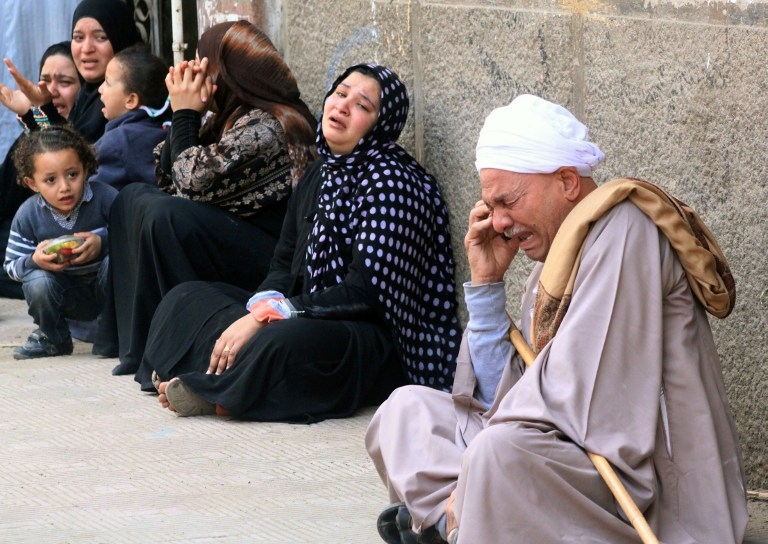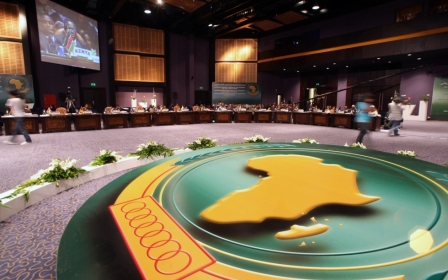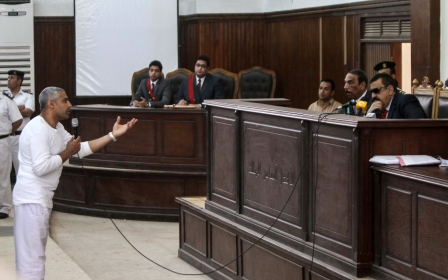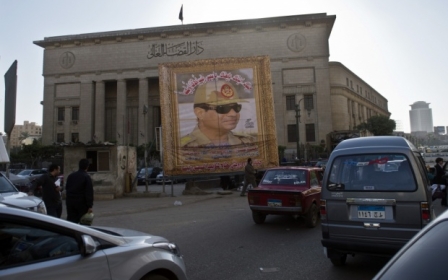Brotherhood’s lawyers press African Union over Egypt’s use of death penalty

Lawyers representing the Muslim Brotherhood’s Freedom and Justice Party (FJP) lobbied Africa’s highest judicial authority again on Saturday to intervene against Egypt’s use of mass death penalties.
At the proceedings in Banjul, the Gambian capital, the FJP’s lawyers for the first time came face to face with lawyers representing Egypt as the parties offered evidence about the country’s use of the death penalty to the African Union’s Commission for Human and People’s Rights.
The commission will now consider the parties’ submissions and present its findings and recommended actions to the AU’s authorities.
Egypt is a signatory to the African Charter, the AU’s human rights instrument, which rejects the death penalty and protects rights to a fair trial. Over the past year, the commission has tried at least twice to intervene in Egypt on behalf of hundreds of people sentenced to death in mass trials, but with little result.
Saturday’s proceedings came in the run-up to the next AU heads of state meeting, scheduled for June, in which leaders could choose “at the highest level” to take political measures against Egypt, including economic sanctions, the FJP’s lawyers said.
“There are various steps that the AU can take against Egypt to enforce the decisions of the commission,” Rodney Dixon QC, of Temple Garden Chambers in London, told MEE on Sunday from Gambia.
Tayab Ali, partner at ITN Solicitors in London and a member of the Muslim Brotherhood's legal team who was also in Gambia, said the mass sentences are being used as “part of a widespread and systemic imposition of capital punishment in order to quell peaceful democratic opposition”.
“The judicial system in Egypt is being used to prop up serious acts of state repression, and the African Commission must continue to hold Egypt to account,” he said.
Since the military coup in July 2013, hundreds of Egyptians have been sentenced to death in what are thought to be the largest mass penalty cases in Africa’s recent history. At least another 20,000 Egyptians are in detention awaiting trial.
The AU’s human rights commission, at the request of the lawyers, has tried at least twice over the past year to force Egyptian officials to reverse the death penalties.
Last April, the commission sent a letter to Egypt’s then acting president Adly Mansour, urging officials to suspend the death sentences of 529 Egyptians, sentenced by a court in Minya, Upper Egypt, after a trial that lasted less than two days.
Most of the defendants, who were accused of various crimes related to an attack on a Minya police station in August 2013, including killing a police officer, were tried in absentia and without legal representation, according to the FJP’s lawyers.
Three days after the letter was sent, the judge in the case upheld the death sentences of 37 of the original 529 and, in a separate case, sentenced 683 others to death on charges of killing a policeman also in August 2013.
On 26 February, the commission sent another letter, prior to the execution of Mahmoud Ramadan - the first Egyptian to be executed since the coup - urging authorities not to carry out his death sentence and to fully investigate allegations made by Ramadan that his confession had been extracted under torture.
Ramadan was convicted last year of throwing a teenager off a roof in Alexandria during unrest that followed the ousting of Mohammed Morsi.
Ten days after the letter, Ramadan was executed by hanging.
“I imagine there will be a certain sense of frustration with [the commission’s] attempts to bring some sense to the situation in Egypt, that they are being ignored,” Toby Cadman, an international law speciality and barrister at Nine Bedford Row International Chambers of London, told MEE in March. Cadman has advised several groups involved in Egypt.
“We know they have been trying to push them in the right direction, but it doesn’t seem to be doing any good. [President Abdel Fattah al-] Sisi doesn’t seem to listen to anyone,” he said.
Middle East Eye propose une couverture et une analyse indépendantes et incomparables du Moyen-Orient, de l’Afrique du Nord et d’autres régions du monde. Pour en savoir plus sur la reprise de ce contenu et les frais qui s’appliquent, veuillez remplir ce formulaire [en anglais]. Pour en savoir plus sur MEE, cliquez ici [en anglais].




